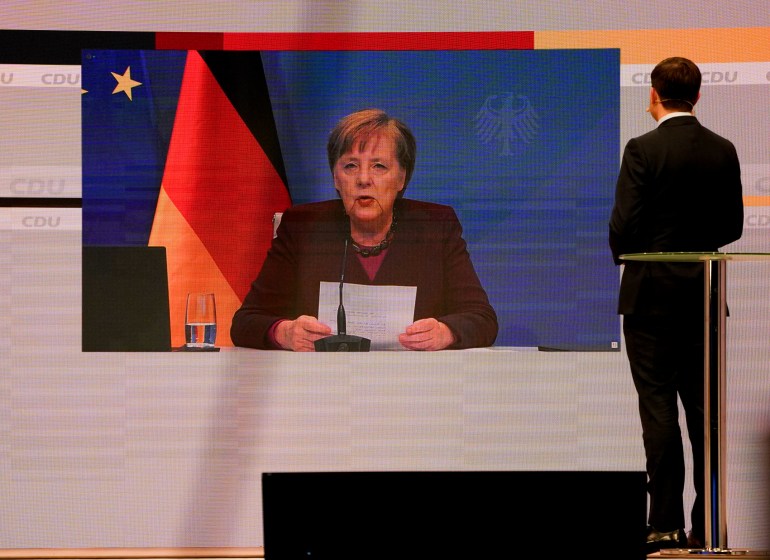In elections described as crucial for the future of Germany, the German Christian Democratic Union Party today, Saturday, chooses a figure for its presidency, in a fundamental step towards the succession of Chancellor Angela Merkel, who will leave office this year.
The winner of this ballot will in fact be in a good position to lead the conservative camp in the legislative elections in September and take over the chancellery position to succeed Merkel, who has governed since 2005.
Through these elections, the conservative party must choose between continuing Angela Merkel’s politics or drifting towards the far right.
The party’s 1,1001 delegates will have to choose between moderate Armin Laschet and Friedrich Meretz, who favors a break with Merkel’s centrist era, or the newcomer Norbert Rutgen on the scene.
The poll, which is taking place in two rounds, its results will be announced later this evening, Saturday, in a completely hypothetical conference due to the emerging Corona virus epidemic.
And if the results do not seem conclusive in favor of a party, then it is certain that for the first time since 2000, a woman will not head the Christian Democratic Union.
The party's conference takes place via video to avoid the risks of the spread of the Corona virus (Reuters)
One district, different personalities,
and the three candidates from the Renania region of North Westphalia, but they differ in their personalities:
1- Frederick Meretz has been
described as the archenemy of the Chancellor since his
dismissal
from the presidency of the conservative bloc in the House of Representatives (Bundestag) in 2002, and dreams of revenge, even if he tried to reduce the importance of the differences with her in the recent period.
The former businessman and lawyer combines economic liberalism with hard-line stances on immigration and is likely to attract voters lured by the far right.
This former lawyer tops opinion polls among supporters of the Christian Democratic Union, but he also faces criticism for not exercising any official job, and his provocative statements and his highly-paid job at Blackrock Asset Management are all points that harm his image.
2- Armin Laschet
is 59 years old and has many strengths.
He is a moderate journalist, following in the footsteps of the hugely popular German chancellor.
Laschet may appeal to centrist voters.
But he was criticized for his treatment of the Corona epidemic in the region of Reinania, North Westphalian, which has the largest population in Germany.
3- Norbert Rutgen
An expert in international relations (55 years), and asserts that he does not belong to any "camp, and this promises to renew the party and its" feminization. "
Like Meretz, he is disappointed with Merkel, who in 2012 forcefully ousted him from the government after an electoral defeat.
Merkel said she prefers to follow a "middle" path and rejects polarization (Getty Images)
Merkel’s will,
regardless of the winner in these internal elections, will not solve the issue of running for the chancellery before the spring.
In an opening speech, Merkel called for unity among party members and said she would like a team - in opposition to a specific individual - to push the party forward.
In a speech broadcast Friday evening at the opening of the conference, Merkel hinted that she prefers the "team" that he forms with Health Minister Jens Young.
She said she prefers to follow a "middle" path and rejects polarization.
Traditionally, the leader of the Christian Democrats leads the election campaign as a candidate for the chancellery of the party and its sister ally in the state of Bavaria, the Christian Social Party.
But this year, other potential contenders to lead the Christian coalition have emerged in the elections, notably the head of the Christian Social Party and the head of the Bavarian state government, Markus Söder, one of Germany's most popular politicians.
A decision on the party's candidate for the chancellor is expected in March.
The party's general conference had been postponed twice due to the Corona pandemic
The new leader will take over from Defense Secretary Annegret Kramp-Karnbauer, the successor that Merkel supported in her retirement plan, which failed to impose her control over the party and announced last February that she would step down from his presidency.

